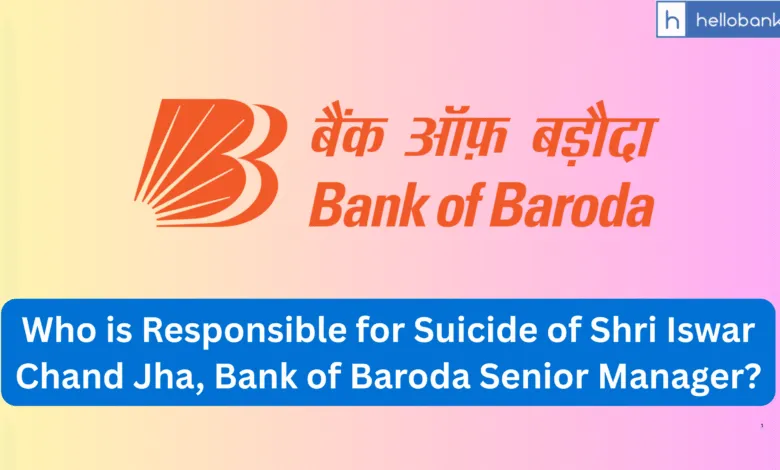Who is Responsible for Suicide of Shri Iswar Chand Jha, Bank of Baroda Senior Manager?

All India Bank of Baroda Officers’ Union (affiliated to AIBOA) has written a letter to the MD & CEO of Bank of Baroda regarding toxic work environment prevailing in the Bank.
The union has highlighted tragic incidents arising out of intolerable work pressure, toxic work culture, and forced late sittings being imposed upon officers across Zones and Regions. These practices have led to severe distress in personal and family lives, pushing our officers into depression, desperation, and even suicides.
Despite the tragic loss of Com. Shiv Shankar Mitra, Chief Manager of the Baramati Branch, Pune Zone, there has been no noticeable change in the attitude or practices of the management. The same working environment continues, leading to another alarming incident: a female Chief Manager, Ms. C. Rajlakshmi (Kerala), who, under severe duress, left behind a suicide note but was fortunately traced in time.
Regretfully, an even more tragic development has now come to light. Shri Iswar Chand Jha, Senior Manager, Ranchi, ended his life during the night of 19th–20th September 2025. The background of the incident is worrisome.
He was going home daily after 9 p.m. because of overstaying in the branch to meet out the work pressure. This spoiled his work life balance and disrupted his family life. His is wife is working in Punjab National Bank.
On 19th September, a routine review meeting of Branch Heads and Credit Officers was called by the Regional Head in the evening which was to be concluded in reasonable time.
Meanwhile, the Zonal Head, Smt. Swapna Bandopadhyay, convened a review meeting with Regional Heads and Dy. Regional Heads from 8:00 p.m. to 9:30 p.m., due to this the concerned officers were compelled to remain waiting. The meeting eventually concluded only around 10:00 p.m.
The wife of the deceased had called him on the phone because he had not returned home even after 9 p.m. She was upset and argued with him, asking him to come back immediately. Other officers present at the meeting also witnessed this conversation. His wife had been expecting him to give more time to her and their children, but due to his heavy workload, he was unable to do so. When he finally reached home late that night, a heated and prolonged quarrel followed. Feeling helpless and under pressure from both work and family expectations, he sadly took his own life.
The union has asked now, who will take responsibility of this incident? HR department at BCC, Mumbai who were supposed to issue guidelines to arrest late sittings in the branches and allowed this type of imbalances of work-life and family life? or Regional Head who held the meeting after office hours? or
Zonal Head Smt. Swapna Bandopadhyaya.
This cannot be brushed aside merely as “suicide” but must be seen as a direct consequence of managerial practices amounting to abetment and institutional murder.
The Union has demanded the following immediate actions from the Bank:
- (a) Issue a clear, written and public circular to all Zonal and Regional Heads, prohibiting late evening review meetings and forced late sittings in branches.
- (b) Fix personal accountability on Smt. Swapna Bandopadhyay, Zonal Head, for the incident at Ranchi and take exemplary action.
- (c) Institute a time-bound independent enquiry into all suicides and attempted suicides linked with workplace stress in the Bank in the last 24 months.
- (d) Introduce enforceable Work-Life Balance Guidelines, in line with principles of dignity of labour and international standards.
- (e) Advise the RMs/ZMs to hold one review meeting only in a week and that too with Branch Heads only, not with second or third line officers.
The Union has said that the lives of our officer colleagues cannot be allowed to become expendable under any managerial excuse.
The Union stated – We expect an urgent and reasoned response within seven days including issuance of circular requested, failing which we shall be compelled to explore legal remedies including, but not limited to, approaching the competent authorities under the Industrial Disputes Act, Labour Commissioners, Human Rights Commissions, and registering criminal complaints wherever warranted.
